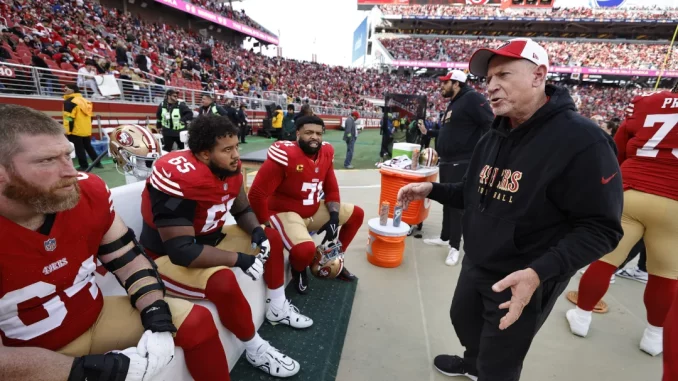
When it comes to the 49ers roster-building methodology, offensive line coach Chris Foerster seems to have explained a peculiar strategy at a key position.
If you’re anything like most San Francisco 49ers fans, you’ve probably spent your time since the Super Bowl looking for an upgrade on the likes of offensive linemen Colton McKivitz and Spencer Burford, or possibly even hoped for a long-term replacement for all-world left tackle Trent Williams.
Heck, we here at Niner Noise devoted multiple column inches to possible offensive line targets in both free agency and the 2024 NFL Draft, and in pretty much all cases, high picks or high investments were suggested.
Yet the 49ers largely stood pat, save for the drafting of third-round guard Dominick Puni and a late-round flyer on sixth-rounder Jarrett Kingston.
Puni was only the third offensive lineman drafted in the first three rounds in the head coach Kyle Shanahan era, joining the now-departed Mike McGlinchey and current starting left guard Aaron Banks.
You may have wondered why, especially given the availability of possible good prospects in the trenches at various points over multiple drafts.
Well, we may finally have an explanation. And it’s an odd one,
Chris Foerster shares bewildering draft strategy for O-line
Speaking Wednesday, offensive line coach Chris Foerster made some interesting comments about the acquisition of talent for his position group:
“”This is my personal opinion, if they ask me, invest in guys that touch the ball, guys that can touch the ball and score touchdowns, and then there’s a range of guys, second, third, fourth round, fifth round even, that we will find starting offensive linemen in.””
It’s not that Foerster’s flat-out wrong. The fact he is a Shanahan coaching disciple probably explains this being his thought process, because any glance at any O-line under Shanahan, or even his coaching father, Mike Shanahan, would show you that acquiring talent for a zone-blocking scheme is more about skill set and coachability than it is hype or draft position.
Even the classic Niners teams under legendary head coaches Bill Walsh and George Seifert ran similar schemes, and many less-heralded players were coached up into top talent by unsung 49ers hero Bobb McKittrick.
It’s also just a general verbalization of the 49ers’ current policy: pay big at what the team sees as “premium” positions, like edge rusher, wide receiver or cornerback, and make savings elsewhere where possible.
However, the issue with Foerster’s comments lay in a fundamental truth of football, which is: you can have all the flashy players in the world, but ultimately, without pass protection and solid run blocking, it’s meaningless.
To illustrate this, consider the Niners have largely maintained a similar core of skill position players for the last few years (save for additions of late, like running back Christian McCaffrey), but each season has ended with key blocks being missed rather than a lack of ability to manufacture key plays.
Is this 49ers strategy a wise one?
In 2021, it was missing blocks on former Los Angeles Rams defensive tackle Aaron Donald that allowed him to kill off the NFC Championship game and largely end then-Niners quarterback Jimmy Garoppolo’s honeymoon period, and realistically, his 49ers career. 2022 ended with a missed block (admittedly from a backup tight end, who perhaps shouldn’t have been in the game at all) that brought a premature end to quarterback Brock Purdy’s season, and while 2023 didn’t necessarily end on a missed block, if Burford had been able to even slightly slow down Kansas City Chiefs defensive tackle Chris Jones on the key play in overtime, the 49ers could’ve been defending a Super Bowl title this year.
It’s even odder when you consider Kyle Shanahan’s capability for manufacturing offense regardless of who he has available at skill positions. Even in 2017, Shanahan’s first year as head coach when the team was decidedly short of talent, he was still able to draw up plays that got relatively poor players wide open for big plays.
While it definitely benefits from its current talent level, does a 49er offense need borderline All-Pro talent at each skill position?
Regardless, Foerster’s comments seem an oddly blasé attitude to apply to a position group that has remained important despite the many evolutions of the game of football, and particularly odd ones for an offensive line coach to make. While it’s clear that he’s relatively happy with the position group, it’s also hard to imagine that having a better, younger talent at right guard or tackle from the earlier rounds of the draft wouldn’t have helped the team in the last two seasons.
Hopefully the 49ers do apply some exceptions to this rule, because if, for example, the Niners are hoping to replace premium talent like Trent Williams with picks in the mid-to-late rounds, they may find themselves in for a huge disappointment and it may set the team back moving forward.
Copyright © 2025
Leave a Reply